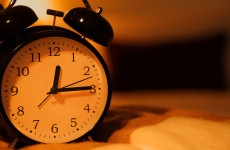Top Stories
Clocks Fall Back This Weekend: How It Affects Your Health

UPDATE: The clocks will go back one hour at 2 AM on October 29, 2023, impacting millions as daylight saving time comes to an end. This change can disrupt our natural body clocks, leading to significant health implications, especially for women.
New research from Liverpool John Moores University and the University of Oxford reveals that the transition is linked to increased stress and wellbeing issues, particularly among women. Over 12,000 participants took part in a survey conducted just before and after the clock change, highlighting a stark contrast in experiences between genders.
Participants reported feelings of worry and confusion as the nights grow darker earlier. One woman stated, “I am spinning out of control. Mind is overactive.” In contrast, many men felt they had gained an “extra” hour of productivity, emphasizing the differing impacts of this seasonal shift.
The body’s internal clock, or circadian rhythm, plays a crucial role in our daily functioning. According to Dr. Catherine Conlon, a public health doctor with the HSE in Cork, understanding and listening to these rhythms is vital. “As the clocks go back, it’s not just about the hour change, but how we align our routines with our body’s natural rhythms,” she warns.
Historically, the practice of daylight saving began in 1916 in Germany as an energy-saving measure during World War I. Despite the debate surrounding its efficacy, many continue to question whether the clock change is beneficial. Professor David Malone from Maynooth University suggests that maintaining a consistent time—whether summer or winter—could mitigate adverse effects.
This weekend’s change could bring more than just a temporary adjustment. The rapid transition can disrupt sleep patterns, affecting overall health and mood. As daylight dwindles, many report a worsening work-life balance, leading to increased anxiety and stress levels.
The survey results reveal a concerning trend: women are more likely to experience negative emotional impacts, associating the time change with guilt and stress. Men, on the other hand, reported greater life satisfaction post-transition. The researchers emphasize that the abrupt shift prevents a gradual adaptation to shorter days, exacerbating feelings of dread among many.
As the world becomes increasingly connected through technology, our sleep and work schedules are often misaligned with natural light patterns. Experts recommend safeguarding time for rest and routine to combat the adverse effects of this clock change.
The call to action is clear: as we adjust our clocks this weekend, consider not just the time, but how we manage our health. Prioritizing adequate sleep and establishing a routine can make a significant difference in well-being.
As the clock strikes 2 AM on Sunday, millions will face a new reality—a reminder of the importance of listening to our body clocks as much as our calendars.
-

 Top Stories3 months ago
Top Stories3 months agoTributes Surge for 9-Year-Old Leon Briody After Cancer Battle
-

 Entertainment4 months ago
Entertainment4 months agoAimee Osbourne Joins Family for Emotional Tribute to Ozzy
-

 Politics4 months ago
Politics4 months agoDanny Healy-Rae Considers Complaint After Altercation with Garda
-

 Top Stories4 months ago
Top Stories4 months agoIreland Enjoys Summer Heat as Hurricane Erin Approaches Atlantic
-

 World5 months ago
World5 months agoHawaii Commemorates 80 Years Since Hiroshima Bombing with Ceremony
-

 Top Stories3 months ago
Top Stories3 months agoNewcastle West Woman Patricia Foley Found Safe After Urgent Search
-

 Top Stories5 months ago
Top Stories5 months agoFianna Fáil TDs Urgently Consider Maire Geoghegan-Quinn for Presidency
-

 World5 months ago
World5 months agoCouple Convicted of Murdering Two-Year-Old Grandson in Wales
-

 World5 months ago
World5 months agoGaza Aid Distribution Tragedy: 20 Killed Amid Ongoing Violence
-

 World5 months ago
World5 months agoAristocrat Constance Marten and Partner Convicted of Infant Murder
-

 Top Stories4 months ago
Top Stories4 months agoClimbing Errigal: A Must-Do Summer Adventure in Donegal
-

 Top Stories4 months ago
Top Stories4 months agoHike Donegal’s Errigal Mountain NOW for Unforgettable Summer Views









